Nepal’s Maoist leader Pushpa Kamal Dahal aka Prachanda has cancelled his visit to Australia, apparently due to fears he may be arrested for war crimes.
Prachanda, who was to visit Australia at the invitation of his party’s overseas arm, axed the trip at the last moment on Thursday night, citing the political situations in Nepal.
But an email circulated by the office of the New South Wales Premier told a different story.
Australian human rights activists lodged complaints citing Prachanda’s poor human rights record during the 1996-2006 Maoist insurgency which left thousands dead and many more missing and displaced.
Prachanda was scheduled to inaugurate a convention of the People’s Progressive Forum, the party’s foreign wing in Sydney, the capital of the New South Wales.
Responding to complaints by rights defenders, the premier’s office said the issue should be brought to the attention of the New South Wales Police.
An email by Gayle Mitchell, correspondence manager of the premier’s office, said it had forwarded the e-mail to Troy Grant, the deputy prime minister and minister for justice, and the police.
According to officials, this led Prachanda to cancel his visit to Australia.
The officials said Prachanda and other Maoist leaders had not visited Western democracies since they left the government in 2012.
Prachanda led a guerrilla war against the government and later served as prime minister of Nepal from 2008 to 2009.
He resigned from the post of prime minister on May 4, 2009, after his move to sack the Nepalese chief of the army staff Rookmangud Katawal was opposed by President Ram Baran Yadav.
In 2013, Nepal army’s Colonel Kumar Lama was arrested in Britain.
Lama, who was serving in the UN peacekeeping mission in Sudan, was on a vacation in London when he was arrested on charges of torturing two persons in an army barrack.
Lama’s case is being tried in London as a criminal offence under Section 134 of the Criminal Justice Act (1988).
Universal jurisdiction comes into play when a state fails to provide justice due to either incompetence or unwillingness, rights activists say.

Pushpa Kamal Dahal
